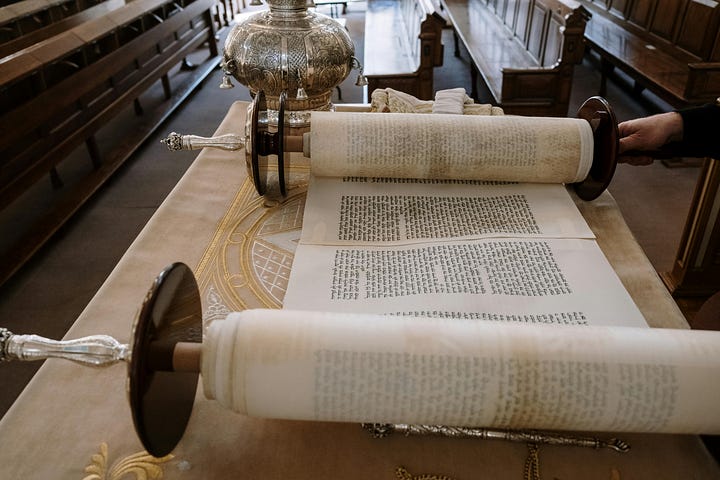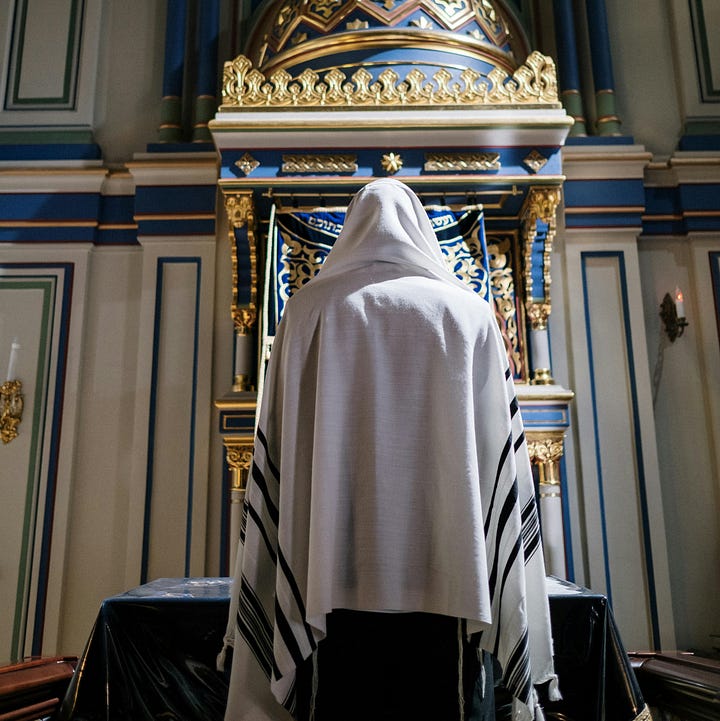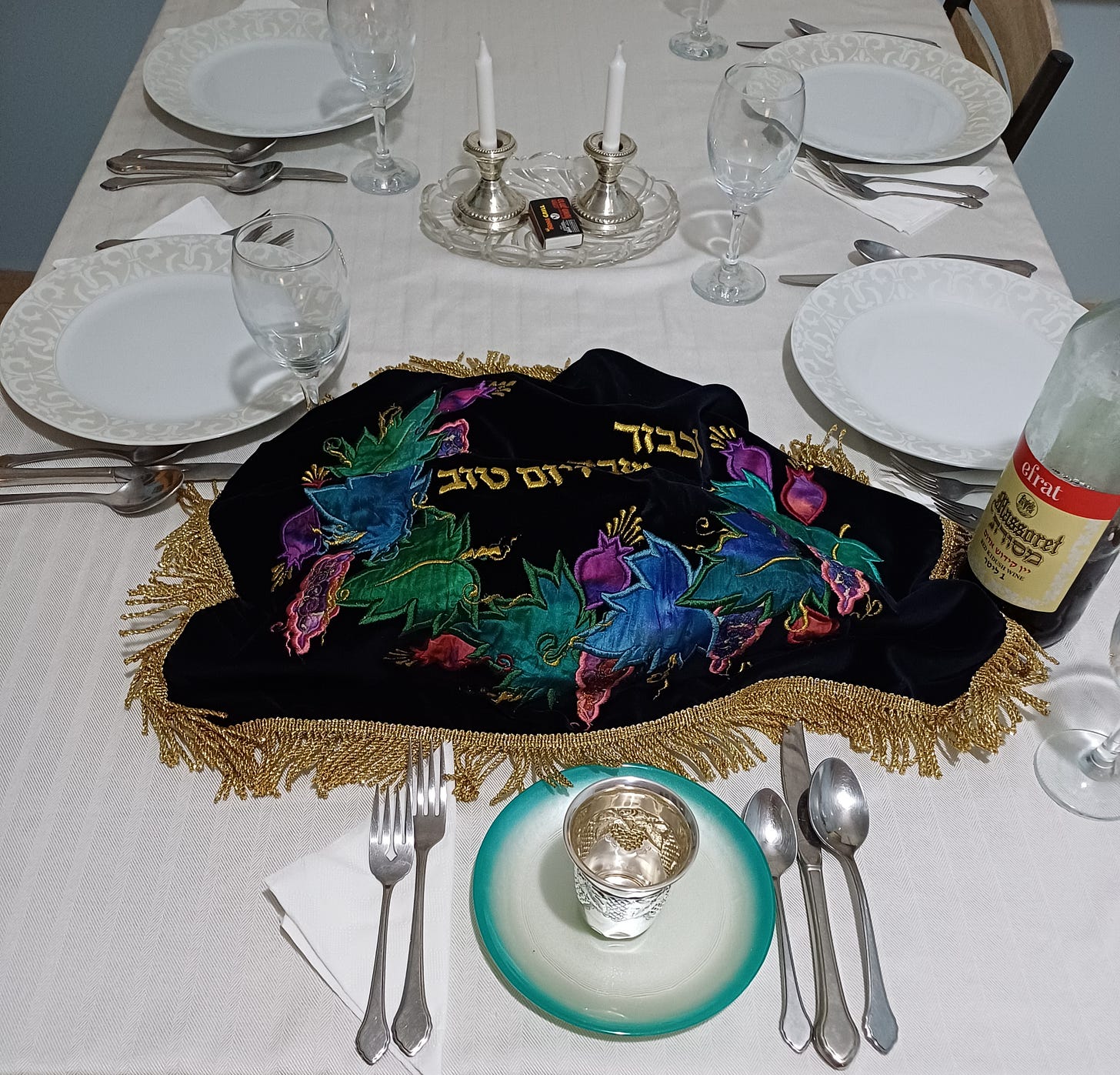Finding Roots
A story for young teens. The story-within-a-story was shared for the first time at my family's Shabbat table when I was around 15 years old.
I’m an old woman now, but I still remember a Shabbat that changed my life. How can one night change your life, you ask? Well, it was like this.
I was fifteen years old that autumn. In September, right after the High Holidays, Sunday School began. The confirmation class was a kind of Judaism-in-Review class for kids of my age so we’d be ready for the confirmation ceremony in the spring. Most of the kids in the class had had a bar or bat mitzvah when they were 13. My family, though, had moved from a community without a temple when I was already14. The rabbi said I was too old for a bat mitzvah, but that this ceremony was more important because I was older and would understand more.
That first week of Sunday School we had a quiz to show the teacher how much we knew. Then we went over the correct answers. Some kids had answered that we read from the talis and wore the Torah, that Queen Esther was the heroine of Hanukkah, and other really silly answers. I had only had two years of Sunday school because of moving around, but even I knew that a talis was a prayer shawl and the Torah was the scroll that was read on Shabbos, and that Esther was in the Purim story. I wasn’t sure whether kids had chosen wrong answers to prank the teacher, or whether they were so stupid that they really didn’t know.


I was really disgusted. I was disgusted with Sunday School and about Judaism. We were taught some things, but no one actually took them seriously. For example, the teachers talked about Shabbos being a day of rest, but really? My family “did Shabbos” Friday nights, except when we had some other activity. Then on Saturdays we cleaned the house. Sometimes my brother had a track meet, so we’d go sit in the bleachers to cheer him on. Maybe we’d go shopping. Sometimes I’d help my mother cook a whole lot that we froze to use when she was going to be late coming home from work. Saturdays were not exactly restful days!
And then there were the prayers. We had to memorize one that said, “And you shall love God with all your heart, with all your soul, and with all your might.” I didn’t have a clue what or who God was, and how can you love something that doesn’t make sense? We never, ever talked about God in Sunday School.
And the Holocaust. From the time I was little I had known people with numbers on their arms that came from the camps. I knew it was bad, but it was years ago, before I was born. I was sorry for the people who had been through it, but most of the ones I knew were crazy or mean. I knew a girl whose mother scrubbed the garage floor, I mean on her knees with a brush, every week, for heaven’s sake! Why couldn’t they just get on with their lives?
It all seemed hypocritical.
That all changed the Friday night my mother invited her friend Mrs. MacMahon and her family over for Shabbos dinner. Mrs. MacMahon was a widow with two kids. The boy was in my sister’s class and then there was a younger girl. Mrs. MacMahon’s mother, Mrs. Mattos, lived with them. So the four of them came.
The Shabbos table looked spectacular. Like every Friday night when we were doing Shabbos, my sister, Naomi, and I had set the dining room table with a white damask cloth and the china dishes. I’d polished the candlesticks and kiddush cup so hard that I had to scrub tarnish off my fingers. Naomi set the gleaming candlesticks and the cup on the table just so. I put the challah bread on the board my brother had made and covered it with our best challah cover.
When our company arrived we all went into the dining room. We stood behind our chairs; we would sit down after my father made the blessing on the wine, the kiddush.
As my mother lit the candles and covered her eyes for the blessing, old Mrs. Mattos gasped. I looked up. She had turned white and was gripping the back of her chair. Her mouth flapped like a fish’s—open, shut, open, shut. Nothing came out.
“Mama,” said Mrs. MacMahon, rushing over from her spot, “What’s wrong?”
Mrs. Mattos shook her head. Her daughter pulled out her chair and the old lady sat down hard. She was blinking her eyes quickly, but her mouth had stopped flapping. My mother ran to the kitchen and brought back a glass of water. Mrs. M. nodded thanks, took the glass, and sipped. Finally she looked around the table.
“I’m so sorry for making a scene,” she said in accented English. “But for a moment I was a child again.” She sipped more water. The room was absolutely silent. I’m not sure any of us breathed, waiting for her to continue.
“I grew up on a farm near a small village in Portugal. We lived in a very simple little house that had been in the family for many generations. You know we are Catholic. We were very religious. My aunt was a nun and my father’s cousin was a priest.
“Every Friday my grandma disappeared for awhile. One day—I was about seven or eight—I decided to follow her. She went into her bedroom, lit the kerosene lamp that she kept on the chest in her bedroom, opened the huge old wardrobe, and disappeared inside. I followed. The back of the wardrobe was a heavy brown curtain. I pushed it aside and I saw a hole. Looking down, I saw my grandmother descend a ladder into the blackness. She held the lit lamp with one hand and the ladder with the other.
“As she descended, her lamp sent a little light into the hole. I don’t know if there was a room down there. All I saw was a small table with two candlesticks, black with age, each holding a stubby candle. She lit the candles, and just like you”—Mrs. M. gestured to my mother—"waved her hands around, covered her eyes with her hands, and bowed her head. She looked like she was praying. Then she blew out the candles and started climbing back up.
“When she looked up, she saw me. Her eyes got huge and she gasped. I was afraid she was going to fall off the ladder. Instead she hurried up. She closed the kerosene, which shut off the lamp. Then she grabbed me with her free hand and dragged me out of the wardrobe.
“My gentle grandma, who never raised her voice and never got excited, shook me until my teeth rattled. ‘Don’t ever tell anyone what you saw here!’ she ordered. ‘Never, never tell anyone! We would all be killed if anyone knew!’
“’Knew what, grandma?’ I asked.
“’I cannot tell you now.’ Her voice shook. ‘When you get married, I will tell you. Your Aunt Amalia knew, but she died without having any daughters, and your mother won’t let me tell her. It is a secret that goes from the oldest girl to the oldest girl and no one else.’
“It was all very mystifying. I tried figuring out what this all-important secret was, but never did. I kept my word. She and I never talked about it, and I never asked my mother.
“When I was 11, my uncle in America sent us tickets, and we left Portugal. Grandma stayed in the village with another relative, and we never saw her again. She did not know how to read or write, and of course there were no telephones in villages like ours back then, so that was that.
“I kept my promise to her. I never mentioned what I had seen to anyone…but now I’m telling you.”
Old Mrs. Mattos paused for what seemed like a long time, sipping the water. “In high school, here in California, I read about the Inquisition. I learned that first Spain and then Portugal made all the Jews become Catholic or leave the country. Some became secret Jews, and if anyone found out they were killed. When I learned about them, I thanked Mother Mary that I wasn’t related to those poor people who had to hide their religion or die. I never connected my grandmother with those stories. When I saw you light the candles, it came back to me. …Do you think she was lighting Sabbath candles?”
I stared at Mrs. Mattos and thought about the secret she had carried for probably seventy years. A wardrobe like in the Narnia books, but one that led not to a magical world but to a deep, black hole that held the memory of a dangerous time. I had read that the women from secretly Jewish families in Spain and Portugal did, in fact, often light candles secretly, in places just like what Mrs. Mattos described.
And it seemed, from her story, that almost no one knew, just the oldest daughters. When I’d read about these brave women, I thought it was just a story. But now I knew it was true.
Judaism is passed by the mother. That meant that these women, the oldest daughters of oldest daughters, secretly keeping a tradition for hundreds of years, were still Jews. Even though they were Catholics, they kept one tradition in spite of having a deep fear of being found out and killed. Killed for lighting candles? Or for keeping alive the tiniest memory of being Jewish?
Suddenly, and for the very first time, I became curious about my heritage. What was so important about being Jewish that farmers and village people, peasants, kept such a scary, dangerous secret? Why didn’t they just become real Catholics? Mrs. Mattos seemed like a real Catholic and she had thought her grandmother was one. But inside the grandmother’s heart was a secret worth guarding with her life.
That’s when I understood, all the way to my bones, that there must deep value in being Jewish, even though I hadn’t found it yet.
My ancestors were mostly from Russia. They too had lived in danger because of who they were. But those stories—well, they were mixed up in my mind with the Holocaust. I’d heard so much about Nazis that I was burned out. Bored. Maybe even frightened.
But Mrs. Mattos’s story was new to me.
The old lady shared the story the Friday after we reviewed that stupid test in my Sunday School class. I remember thinking that maybe it was that Sunday School class that was stupid, not Judaism.
I resolved to be confirmed in the ceremony with that bunch of stupid classmates because it would make my parents happy. But sometime, somewhere, I would study more. I would find out about the Judaism that kept Mrs. Mattos’s grandmother sneaking down that steep, dark ladder into a dirt pit hidden behind her wardrobe. Something had made one woman in each generation brave that black hole to honor the Jewish Sabbath and to keep alive, at least in one mind in each generation, ancestors who had risked, and even given, their lives for their God.
For our God.
My journey of learning was long. It upset my relatives, but that was their problem. They had raised me on the sayings “follow your bliss! Follow your dreams! You can be anything you want!” I believed that if that bliss, those dreams, couldn’t be the path of our ancestors, then my parents were hypocritical, too.
So I kept learning and growing.
I am very glad I made that journey into something totally different from the contradictions I’d been taught as a child. I found a deep, rich history and a strong belief in a good God. I learned God gave people free will, and that the Torah tells us He is often disappointed that many people choose evil, not good.
I grew up during the Hippie Era, a time when many young adults, including friends and classmates, damaged their lives with drugs and disease. The Jewish values I learned helped me avoid behaviors and habits that ruined so many lives.
I learned to trust that whatever happened to me came ultimately from God. If I relaxed and made decisions based on faith and Torah I would move into a better time. First I believed this; then I saw it unfold in my life.
I learned much, much more, more than I can possibly tell you here. One thing I can tell you, though: God works in strange ways.
For me to want learn about Judaism, the following strange and seemingly unrelated things had to happen:
A family moved from rural Portugal to California.
A woman was widowed with two very young children.
She needed her mother’s help, so her mother moved in.
My mother met the widow at an Open School program and they became friends.
My mother invited the family, including the grandmother, for Shabbat dinner.
According to Jewish law, the candles should be lit a few minutes after sunset. If my mother had done that, Mrs. Mattos would not have seen her light them. But my mother, in the Reform Jewish tradition, lit Shabbat candles at the table just before eating.
All these seemingly unrelated things happened. They are tied together in this story.
And if old Mrs. Mattos had not told us about her family’s tradition, I do not know if I would have even begun to look for ours.





Inspired- God breathed- we must be open to Divine guidance and intervention. The world is in great need of this. ❤️🩹